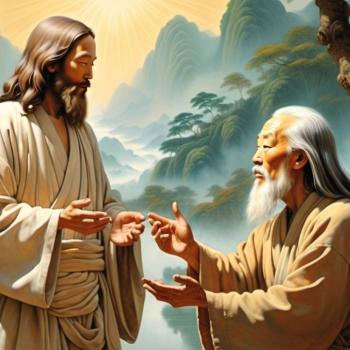Clearly, the commandment against drinking animal blood was serious. To break it would mean being "cut off" from God and from his people. Notice also that it was a universal law. God expected not only the chosen people of Israel to keep it, but any Gentile "strangers" living among them. Finally, note the reason for the prohibition. People were not to consume blood because "the life" or "the soul" (Hebrew nephesh) of the animal is in the blood. As Leviticus states, "It is the blood that makes atonement, by the power of its life." While scholars continue to debate exactly what this means, one thing is clear: in the ancient world, the Jewish people were known for their refusal to consume blood. Jesus' words at the Last Supper become even more mysterious with this biblical background in mind. As a Jew, how could he ever have commanded his disciples to eat his flesh and drink his blood? Wouldn't this mean explicitly breaking the biblical law against consuming blood? Indeed, even if Jesus meant his words only symbolically, how could he say such things? Wouldn't his command mean transgressing the spirit of the Law, if not the letter? As the Jewish scholar Geza Vermes points out,
[T]he imagery of eating a man's body and especially drinking his blood . . . , even after allowance is made for metaphorical language, strikes a totally foreign note in a Palestinian Jewish cultural setting (cf. John 6.52). With their profoundly rooted blood taboo, Jesus' listeners would have been overcome with nausea at hearing such words.
So, what should we make of these words of Jesus?
Through Ancient Jewish Eyes
In this book, I will try to show that Jesus should be taken at his word. Along with the majority of Christians throughout history, I believe that Jesus himself taught that he was really and truly present in the Eucharist. In doing so, I will follow the Apostle Paul, a first-century Pharisee and an expert in the Jewish Law, when he said,
I speak as to sensible men, judge for yourselveswhat I say. The cup of blessing which we bless, is itnot a communion in the blood of Christ? The breadwhich we break, is it not a communion in the bodyof Christ? (1 Corinthians 10:16)
My goal is to explain how a first-century Jew like Jesus, Paul, or any of the apostles, could go from believing that drinking any blood—much less human blood—was an abomination before God, to believing that drinking the blood of Jesus was actually necessary for Christians: "Unless you eat the flesh of the Son of Man and drink his blood, you have no life in you" (John 6:53).
In order to achieve this goal, we will have to go back in time to the first-century A.D., in order to understand what Jesus was doing and saying in his original context. To a certain extent, this will mean taking off our modern "eyeglasses" and trying to see things as the first Jewish Christians saw them. When we look at the mystery of the Last Supper through ancient Jewish eyes, in the light of Jewish worship, beliefs, and hopes for the future, we will discover something remarkable. We will discover that there is much more in common between ancient Judaism and early Christianity than we might at first have expected. In fact, we will find that it was precisely the Jewish faith of the first Christians that enabled them to believe that the bread and wine of the Eucharist were really the body and blood of Jesus Christ.
Unfortunately, as soon as we try to do this, we are faced with a problem. In order for us to hear Jesus in the way his first disciples would have heard him, we need to be familiar with two key sources of information: (1) the Jewish Scriptures, commonly known as the Old Testament, and (2) ancient Jewish tradition, enshrined in writings not contained in the Jewish Bible.
Now, if my experience with students is any indicator, many modern readers—especially Christians—find the Jewish Scriptures to be challenging and unfamiliar territory. This is especially true of those passages in the Old Testament that describe ancient Jewish rituals, sacrifice, and worship—passages that will be very important for us as we explore Jesus' last meal with his friends before his crucifixion. As for ancient Jewish writings outside the Bible—such as the Mishnah and the Talmud—although many people have heard of them, they are often not widely read by non- Jewish readers aside from specialists in biblical studies.
For this reason, before beginning, it will be helpful to briefly identify the Jewish writings that I will be drawing on over the course of this book. (The reader may want to mark this page for future reference as we move along.) I want to stress here that I am not suggesting that Jesus himself would have read any of these, some of which were written down long after his death. What I am arguing is that many of them bear witness to ancient Jewish traditions that may have circulated at the time of Jesus and which demonstrate remarkable power to explain passages in the New Testament that reflect Jewish practices and beliefs.




